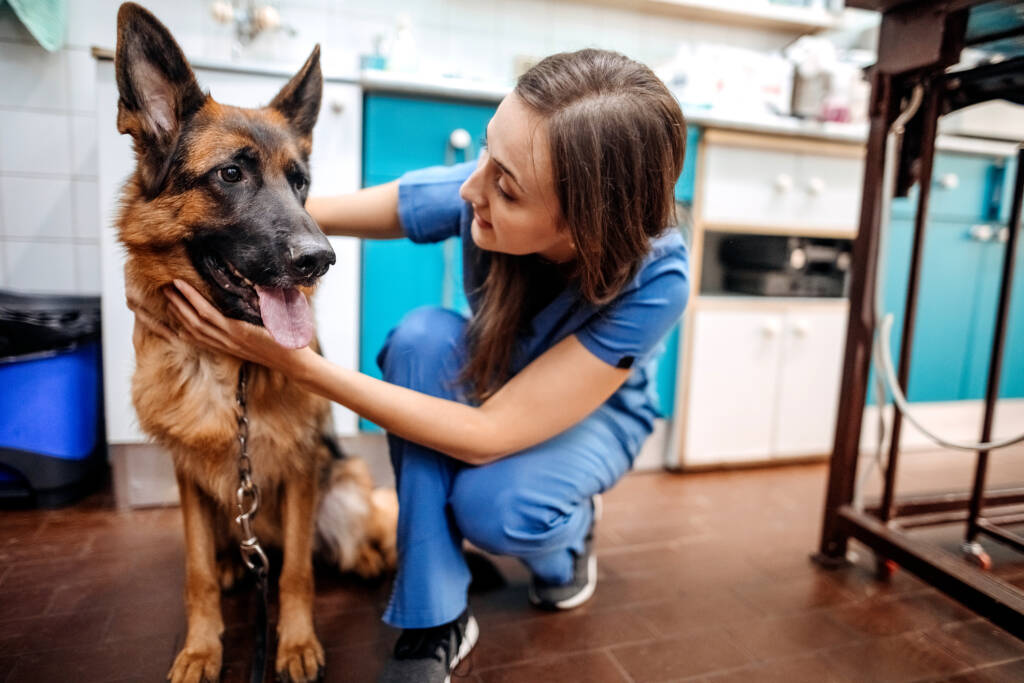
Veterinary Science

As animals play an increasingly important role in our lives, scientists have sought to learn more about their health and well-being. Taking a look at the pets that live in our homes, on our farms, and in zoos and wildlife sanctuaries, this course will examine some of the common diseases and treatments for domestic animals. Toxins, parasites, and infectious diseases impact not only the animals around us, but at times…we humans as well! Through veterinary medicine and science, the prevention and treatment of diseases and health issues are studied and applied.
During this course, you will learn career-related skills and earn a badge for this accomplishment. A badge is a digital certification of your career-related learning that you can share on social media and higher education platforms, or with colleges, potential employers, peers, and colleagues. Select this link to learn more about badges.
This course is one of our Career Exploration offerings.
Major Topics and Concepts
- Discuss what the areas of veterinary science and medicine include and how these areas differ from each other.
- Learn about the history of veterinary science and medicine.
- Examine some of the research areas that veterinary scientists are working on today.
- Investigate the educational and other requirements for veterinarians and veterinary scientists.
- Discuss some of the ethics in the profession and some of the controversial issues.
- Learn what the nervous, endocrine, and gastrointestinal systems consist of and what they do for the body.
- Examine how skeletal and muscle disorders can affect animals.
- Discuss several infectious diseases that animals can catch from infected animals.
- Investigate the causes and symptoms of the diseases discussed in the unit.
- Learn about some of the treatments and preventative measures that veterinary scientists have discovered for these diseases.
- Discuss why the health of horses, cattle, and swine is important for public health.
- Learn about several diseases that can affect horses and how they are treated.
- Examine what mad cow disease is and why it is such a feared disease for cattle.
- Investigate several diseases that affect cattle and the impact that they have.
- Discuss some diseases that affect swine and how they are treated.
- Discuss what exotic animals are and why treating them may take additional education and training.
- Learn about some of the diseases that affect birds and what treatments are used for these diseases.
- Learn about some of the diseases that affect reptiles and what treatments are used for these diseases.
- Examine what roles veterinary scientists may fill in zoological parks and sanctuaries.
- Investigate what challenges veterinary scientists face when working with animals at zoological parks and sanctuaries.
- Discuss what toxicology, toxicity, and toxicosis are and how these concepts relate to veterinary science and medicine.
- Learn how acute toxicosis differs from chronic toxicosis.
- Discuss how exposure to toxins can occur and what factors affect toxicity.
- Examine some of the natural forms of poisoning, such as poisoning from certain plants and fruits and bites from poisonous snakes.
- Investigate some artificial substances that can cause poisoning, such as rodenticides.
- Learn what parasites are and how they relate to hosts.
- Discuss several different types of parasites and how they differ.
- Examine how animals may become infected with parasites and how parasites may be transferred from animal to animal.
- Investigate some of the different symptoms that animals can experience due to parasites.
- Investigate some of the different life cycles for common parasites.
- Learn about zoonoses and why they are a concern to veterinary scientists and public health officials.
- Discuss Hantavirus and how it is transmitted to humans.
- Examine the plague and how this zoonotic disease has impacted human societies throughout history.
- Investigate anthrax and how it can be transmitted to humans.
- Discuss ringworm and the symptoms of this zoonotic infection.
- Learn about holistic and allopathic veterinary treatments and how they differ.
- Discuss the use of acupuncture for the treatment of animal diseases.
- Examine how hydrotherapy can benefit horses and dogs.
- Investigate how herbs and botanicals are used to treat animal diseases.
- Learn about the use of essential oils with animals.
Competencies
Veterinary Science Careers
Students will demonstrate an understanding of veterinary science careers by summarizing contributions of veterinary science, describing career options for veterinarians, and explaining the ethical considerations within the veterinary profession.
Small Animal Conditions
Students will demonstrate an understanding of small animal conditions by explaining common disorders of companion animals and explaining common diseases of companion animals.
Large Animal Conditions
Students will demonstrate an understanding of large animal conditions by describing common diseases in horses, describing common diseases in cattle, and describing common diseases in swine.
Exotic Animal Conditions
Students will demonstrate an understanding of exotic animal conditions by describing common diseases of birds, describing common diseases of reptiles, and explaining the challenges of caring for zoo animals.
Poisoning and Toxicology
Students will demonstrate an understanding of poisoning and toxicology by explaining the importance of toxicology and describing the different ways animals may be accidentally poisoned.
Veterinary Parasitology
Students will demonstrate an understanding of veterinary parasitology by describing the different types of parasites and explaining their effects on their hosts.
Zoonotic Diseases
Students will demonstrate an understanding of zoonotic diseases by describing types of zoonotic diseases and explaining treatment options for zoonotic diseases.
Holistic Veterinary Medicine
Students will demonstrate an understanding of holistic veterinary medicine by differentiating between types of veterinary medicine, describing different forms of holistic medicine for animals, and summarizing the benefits and concerns of providing animals with holistic care.

